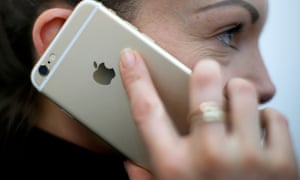Apple says iPhone 'Error 53' is to protect customers' security
Apple says iPhone 'Error 53' is to protect customers' security :

Apple has hit
back at criticism of its controversial “Error 53” message on iPhones, claiming
it is part of measures to protect customers’ security.
On Friday, the Guardian revealed how thousands of iPhone 6 users have had their devices, which
cost hundreds of pounds, left useless after encountering the error message.

The problem is related to the smartphone’s
home button, which contains a Touch ID thumbprint reader that can be used to
unlock the device rather than inputting a four-digit security code.
If the phone is damaged and a non-Apple
repairer replaces the button, a subsequent update of the operating system
detects a non-standard component and shuts down the device. There is no known
way of bringing it back to life.
Many iPhone 6 owners
have only become aware of the issue when installing routine updates to iOS, Apple’s
operating system for iPhones and iPads. It is unclear exactly how many have
been affected.
In a statement released following the
publication of the Guardian’s story, an Apple spokesperson said: “We take
customer security very seriously and Error 53 is the result of security checks
designed to protect our customers. iOS checks that the Touch ID sensor in your iPhone or iPad correctly matches your device’s other components.
“If iOS finds a mismatch, the check fails and
Touch ID, including for Apple Pay use, is disabled. This security measure is
necessary to protect your device and prevent a fraudulent Touch ID sensor from
being used. If a customer encounters Error 53, we encourage them to contact
Apple Support.”
However, some users have also encountered
Error 53 messages even though their device has not been altered or repaired in
any way. That is what happened to US technology writer Mike
Wehner last
year when his iPhone 6 suffered intermittent problems with the Touch ID sensor.
Although he was able to get a replacement
device at an Apple store, thousands of users whose phones have been repaired
have not been so lucky. As third-party hardware has been installed on their
devices, Apple deems its terms and conditions to have been broken and forced
many owners to contribute towards the cost of a new phone.
With many Apple customers left furious at the
company’s stance, one Guardian reader comments: “I think they made an
after-the-fact adjustment to a poorly conceived and implemented security system
on the iPhone. They hadn’t properly considered the implications of third
parties substituting parts on the phones, whether these were bonafide
alterations or not.
“They
didn’t think about the customers at all (Apple are arrogant enough to do this).
Or they decided that it isn’t their problem if customers do something other
than what they recommend. Surely even Apple now realise it is their problem? They will
have to sort it out.”
A reader of the Boing Boing technology blog said
Apple should have advertised the fact rather than keeping it hidden.
If they included a warning in the package
‘tamper resistance’ feature that works by non-Apple-authorised repair services
may be mistaken for tampering attempts, and lead to the phone being disabled’,
then it would be purely a feature ... By concealing the feature prior to sales,
and only even revealing it after being repeatedly pressured over it, Apple
turned what could have been a feature into a landmine.”
Apple shares have fallen more than 20% in the
past three months as investors begin to doubt whether it can maintain the
stellar growth posted since the iPhone first went on sale eight years ago. The
company relies on the smartphone for about two thirds of its revenue.
Last month Apple said iPhone sales were flat for the three months to December, with about 74.8m devices
bought in the quarter. Its most recent device, the Apple watch, has failed to
capture consumers’ imagination and iPad sales are also on the slide.
Much is therefore riding on the success of the
iPhone 7, expected to be released in September, but slowing global smartphone
sales could make that a difficult feat to pull off even for Apple.
(source : The Guardian )
Comments
Post a Comment